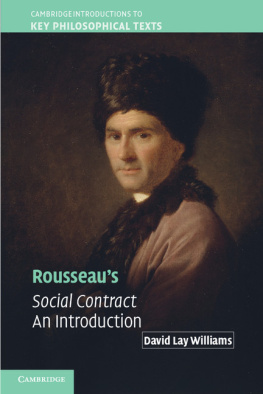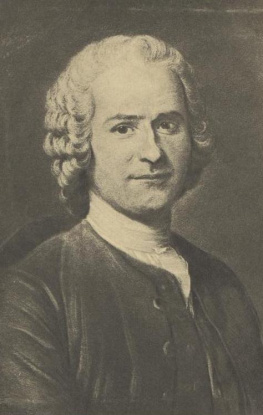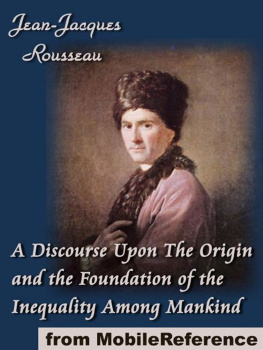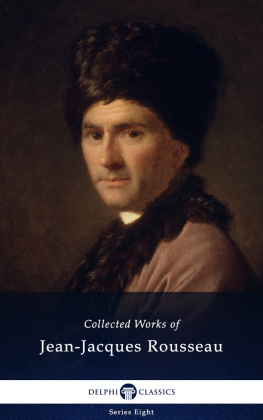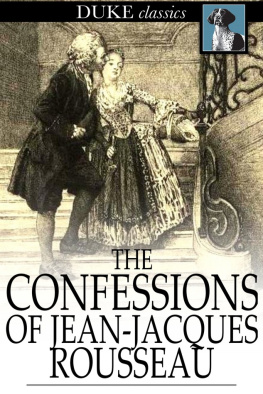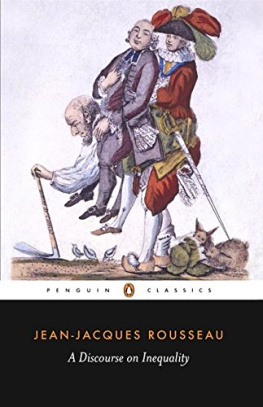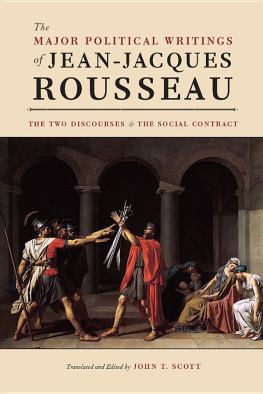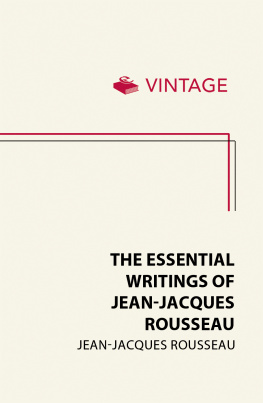Rousseau Jean-Jacques - A Discourse Upon the Origin of Inequality
Here you can read online Rousseau Jean-Jacques - A Discourse Upon the Origin of Inequality full text of the book (entire story) in english for free. Download pdf and epub, get meaning, cover and reviews about this ebook. genre: Science. Description of the work, (preface) as well as reviews are available. Best literature library LitArk.com created for fans of good reading and offers a wide selection of genres:
Romance novel
Science fiction
Adventure
Detective
Science
History
Home and family
Prose
Art
Politics
Computer
Non-fiction
Religion
Business
Children
Humor
Choose a favorite category and find really read worthwhile books. Enjoy immersion in the world of imagination, feel the emotions of the characters or learn something new for yourself, make an fascinating discovery.
- Book:A Discourse Upon the Origin of Inequality
- Author:
- Genre:
- Rating:5 / 5
- Favourites:Add to favourites
- Your mark:
- 100
- 1
- 2
- 3
- 4
- 5
A Discourse Upon the Origin of Inequality: summary, description and annotation
We offer to read an annotation, description, summary or preface (depends on what the author of the book "A Discourse Upon the Origin of Inequality" wrote himself). If you haven't found the necessary information about the book — write in the comments, we will try to find it.
Rousseau Jean-Jacques: author's other books
Who wrote A Discourse Upon the Origin of Inequality? Find out the surname, the name of the author of the book and a list of all author's works by series.
A Discourse Upon the Origin of Inequality — read online for free the complete book (whole text) full work
Below is the text of the book, divided by pages. System saving the place of the last page read, allows you to conveniently read the book "A Discourse Upon the Origin of Inequality" online for free, without having to search again every time where you left off. Put a bookmark, and you can go to the page where you finished reading at any time.
Font size:
Interval:
Bookmark:
The Project Gutenberg EBook of A Discourse Upon The Origin And TheFoundation Of The Inequality Among Mankind, by Jean Jacques Rousseau
This eBook is for the use of anyone anywhere at no cost and withalmost no restrictions whatsoever. You may copy it, give it away orre-use it under the terms of the Project Gutenberg License includedwith this eBook or online at www.gutenberg.net
Title: A Discourse Upon The Origin And The Foundation Of The Inequality Among Mankind
Author: Jean Jacques Rousseau
Release Date: February 17, 2004 [EBook #11136]
Language: English
*** START OF THIS PROJECT GUTENBERG EBOOK INEQUALITY AMONG MANKIND ***
A Discourse Upon The Origin And The Foundation Of The Inequality Among
Mankind
By J. J. Rousseau
Jean Jacques Rousseau was born at Geneva, June 28, 1712, the son of awatchmaker of French origin. His education was irregular, and thoughhe tried many professionsincluding engraving, music, andteachinghe found it difficult to support himself in any of them. Thediscovery of his talent as a writer came with the winning of a prizeoffered by the Academy of Dijon for a discourse on the question,"Whether the progress of the sciences and of letters has tended tocorrupt or to elevate morals." He argued so brilliantly that thetendency of civilization was degrading that he became at once famous.The discourse here printed on the causes of inequality among men waswritten in a similar competition.
He now concentrated his powers upon literature, producing two novels,"La Nouvelle Heloise," the forerunner and parent of endlesssentimental and picturesque fictions; and "Emile, ou l'Education," awork which has had enormous influence on the theory and practise ofpedagogy down to our own time and in which the Savoyard Vicar appears,who is used as the mouthpiece for Rousseau's own religious ideas. "LeContrat Social" (1762) elaborated the doctrine of the discourse oninequality. Both historically and philosophically it is unsound; butit was the chief literary source of the enthusiasm for liberty,fraternity, and equality, which inspired the leaders of the FrenchRevolution, and its effects passed far beyond France.
His most famous work, the "Confessions," was published after hisdeath. This book is a mine of information as to his life, but it isfar from trustworthy; and the picture it gives of the author'spersonality and conduct, though painted in such a way as to make itabsorbingly interesting, is often unpleasing in the highest degree.But it is one of the great autobiographies of the world.
During Rousseau's later years he was the victim of the delusion ofpersecution; and although he was protected by a succession of goodfriends, he came to distrust and quarrel with each in turn. He died atErmenonville, near Paris, July 2, 1778, the most widely influentialFrench writer of his age.
The Savoyard Vicar and his "Profession of Faith" are introduced into"Emile" not, according to the author, because he wishes to exhibit hisprinciples as those which should be taught, but to give an example ofthe way in which religious matters should be discussed with the young.Nevertheless, it is universally recognized that these opinions areRousseau's own, and represent in short form his characteristicattitude toward religious belief. The Vicar himself is believed tocombine the traits of two Savoyard priests whom Rousseau knew in hisyouth. The more important was the Abbe Gaime, whom he had known atTurin; the other, the Abbe Gatier, who had taught him at Annecy.
What is the Origin of the Inequality among Mankind; and whether such
Inequality is authorized by the Law of Nature?
'Tis of man I am to speak; and the very question, in answer to which Iam to speak of him, sufficiently informs me that I am going to speakto men; for to those alone, who are not afraid of honouring truth, itbelongs to propose discussions of this kind. I shall thereforemaintain with confidence the cause of mankind before the sages, whoinvite me to stand up in its defence; and I shall think myself happy,if I can but behave in a manner not unworthy of my subject and of myjudges.
I conceive two species of inequality among men; one which I callnatural, or physical inequality, because it is established by nature,and consists in the difference of age, health, bodily strength, andthe qualities of the mind, or of the soul; the other which may betermed moral, or political inequality, because it depends on a kind ofconvention, and is established, or at least authorized, by the commonconsent of mankind. This species of inequality consists in thedifferent privileges, which some men enjoy, to the prejudice ofothers, such as that of being richer, more honoured, more powerful,and even that of exacting obedience from them.
It were absurd to ask, what is the cause of natural inequality, seeingthe bare definition of natural inequality answers the question: itwould be more absurd still to enquire, if there might not be someessential connection between the two species of inequality, as itwould be asking, in other words, if those who command are necessarilybetter men than those who obey; and if strength of body or of mind,wisdom or virtue are always to be found in individuals, in the sameproportion with power, or riches: a question, fit perhaps to bediscussed by slaves in the hearing of their masters, but unbecomingfree and reasonable beings in quest of truth.
What therefore is precisely the subject of this discourse? It is topoint out, in the progress of things, that moment, when, right takingplace of violence, nature became subject to law; to display that chainof surprising events, in consequence of which the strong submitted toserve the weak, and the people to purchase imaginary ease, at theexpense of real happiness.
The philosophers, who have examined the foundations of society, have,every one of them, perceived the necessity of tracing it back to astate of nature, but not one of them has ever arrived there. Some ofthem have not scrupled to attribute to man in that state the ideas ofjustice and injustice, without troubling their heads to prove, that hereally must have had such ideas, or even that such ideas were usefulto him: others have spoken of the natural right of every man to keepwhat belongs to him, without letting us know what they meant by theword belong; others, without further ceremony ascribing to thestrongest an authority over the weakest, have immediately struck outgovernment, without thinking of the time requisite for men to form anynotion of the things signified by the words authority and government.All of them, in fine, constantly harping on wants, avidity,oppression, desires and pride, have transferred to the state of natureideas picked up in the bosom of society. In speaking of savages theydescribed citizens. Nay, few of our own writers seem to have so muchas doubted, that a state of nature did once actually exit; though itplainly appears by Sacred History, that even the first man,immediately furnished as he was by God himself with both instructionsand precepts, never lived in that state, and that, if we give to thebooks of Moses that credit which every Christian philosopher ought togive to them, we must deny that, even before the deluge, such a stateever existed among men, unless they fell into it by some extraordinaryevent: a paradox very difficult to maintain, and altogether impossibleto prove.
Let us begin therefore, by laying aside facts, for they do not affectthe question. The researches, in which we may engage on this occasion,are not to be taken for historical truths, but merely as hypotheticaland conditional reasonings, fitter to illustrate the nature of things,than to show their true origin, like those systems, which ournaturalists daily make of the formation of the world. Religioncommands us to believe, that men, having been drawn by God himself outof a state of nature, are unequal, because it is his pleasure theyshould be so; but religion does not forbid us to draw conjecturessolely from the nature of man, considered in itself, and from that ofthe beings which surround him, concerning the fate of mankind, hadthey been left to themselves. This is then the question I am toanswer, the question I propose to examine in the present discourse. Asmankind in general have an interest in my subject, I shall endeavourto use a language suitable to all nations; or rather, forgetting thecircumstances of time and place in order to think of nothing but themen I speak to, I shall suppose myself in the Lyceum of Athens,repeating the lessons of my masters before the Platos and theXenocrates of that famous seat of philosophy as my judges, and inpresence of the whole human species as my audience.
Next pageFont size:
Interval:
Bookmark:
Similar books «A Discourse Upon the Origin of Inequality»
Look at similar books to A Discourse Upon the Origin of Inequality. We have selected literature similar in name and meaning in the hope of providing readers with more options to find new, interesting, not yet read works.
Discussion, reviews of the book A Discourse Upon the Origin of Inequality and just readers' own opinions. Leave your comments, write what you think about the work, its meaning or the main characters. Specify what exactly you liked and what you didn't like, and why you think so.



